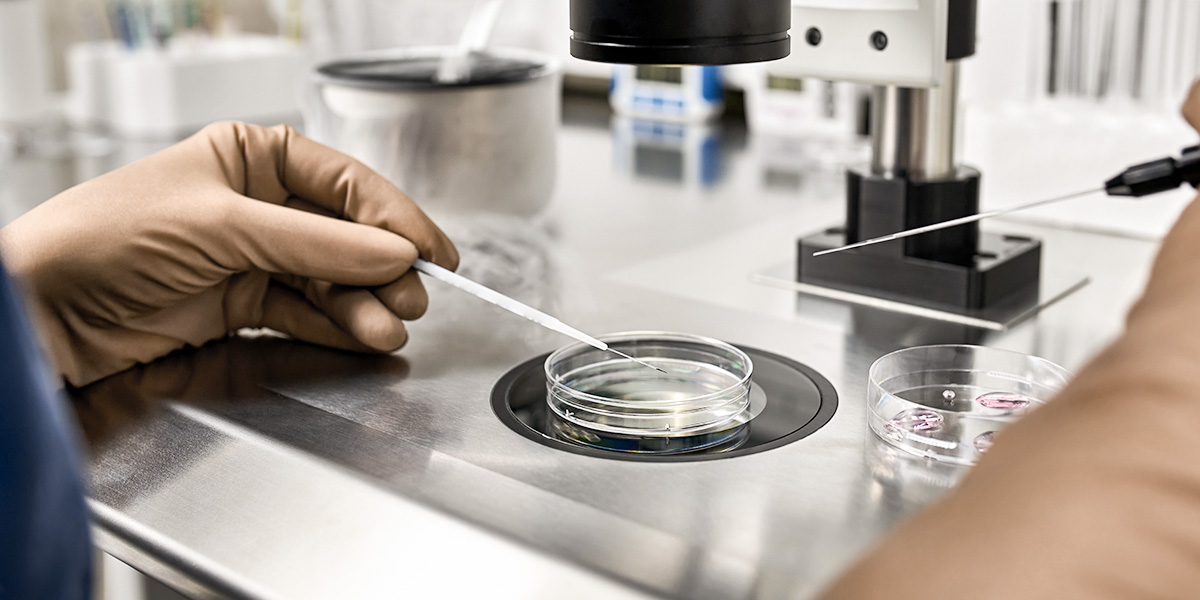Follow Us!
Patient stories, informative videos and much more on our social media accounts

IVF (in vitro fertilization) treatment is the most applied assisted reproductive treatment (ART) method, this treatment is fertilization of oocyte or otherwise known as egg colelcted from ovaries and sperm cells of the male partner in the laboratory environment. This fertilized egg is named as embryo.
IVF treatment helps to couples with a desire to have a child but cannot conceive in the natural way for different medical conditions. IVF treatment generally has 5 stages, stimulation, egg collection (OPU), insemination, creation of embryo culture and transfer.
Naturally, women produce one egg cell in a menstrual cycle however, to be able to increase the success rate of IVF treatment we need more than one egg cell. Therefore, physician aim to increase number the egg cell can be produced in the body with certain medications. Second step of the treatment is called follicular aspiration, it is commonly known as egg collection or OPU procedure. This procedure is performed under anesthesia physicians use the guidance of ultrasound images and with a help of needle they reach to ovaries to collect egg cells.
Third stage of the IVF treatment is fertilization of the egg cells with the sperm sample given from the male partner in this way embryo is obtained. Formed embryo is being monitored and followed for segmentation and development. As the time passes embryo grows and embryo culture should reach to certain size before it can be transferred to the uterus.
Embryologists wait embryo to grow to certain size before the embryo transfer (implantation). This procedure takes 3 to 5 days after the fertilization. For the embryo transfer thin tube called catheter is used. This catheter is used to reach uterus by passing vagina and cervix, this catheter is than used to implant embryos to the uterus.
Following the embryo transfer with the adherence of embryo to the uterus wall, it is accepted as the start of pregnancy. Adherence process takes about 6 to 10 days. To understand whether if the pregnancy start blood analyses is used.
Embryo transfer is the most important stage of the IVF treatment. It is normal to be anxious about the result of treatment. Therefore, people may seek some information to relief their anxiety about the result of their treatment.
Result of your IVF treatment can change your life totally, therefore you have some time before you get your results to spoil yourself for few days. There are few days before adherence takes place after transfer procedure. We advise you to be relax and take some time off to rest. In the literature, we see the advantage of not doing heavy duties after your transfer. However, by that we do not mean, you should stay in bed for couple of days. As well not involving in heavy duties we advance you to stay away from psychological and emotional stress.
Adapting to healthy and regular dietary habits will ease your pregnancy. Generally, consuming fruits and vegetables along with nutrition that contains rich calcium, protein B, vitamins and iron is advised. However, some physicians may decide to give food supplements along with diet to support patients vitamin and mineral levels. Folic acid supplements are especially important to avoid some diseases like neural tube defect.
During this time, we also advise female patients to stay away from chemicals that can impact hormonal levels. Bisphenol A (bpa), Ftalat, parabens and triclosan will have negative affect of your hormonal levels.
Another thing to stay away from during the time between your transfer till you get your results is having sex. Following embryo transfer, contraction in muscles at uterus has negative affect on conceiving therefore it is advised to have sexual abstinence until you get your results.
You need to be patient to have pregnancy test. Following the adherence of embryo to the uterus, placenta cells secrete a hormone call HBG this is also known as pregnancy hormone before we can observe this hormone few weeks should pass.
During this period, prescribed medication should not be stopped with a personal decision. Many women need additional progesterone hormone to make sure pregnancy continues at the early stages, progesterone hormone has vital importance at early stages of pregnancy to make sure pregnancy continues, as it helps adherence of embryo to the uterus.
Approximately 2 weeks after the embryo transfer pregnancy test can be done, this test is called Beta HCG it is performed by blood analyses. That 2 weeks can be an anxious waiting for the patient, and this is normal. There are some signs that can point towards positive result, however, always keep in mind that this can be caused by the medications that you have used during your treatment. Bleeding and spotting are one of the most common signs of adherence.
Having very thin bleeding is generally acceptance as a sign of pregnancy. This can be related with the adherence of embryo to the uterus, or it can be related with the medication used after embryo transfer. Along with this, late menstruation or irregular menstruation can be a sign of pregnancy. Especially for women with very regular menstruation, not having menstruation after your transfer can be a sign of pregnancy.
Having nausea and vomiting especially at the morning hours, is generally a symptom of pregnancy but these symptoms starts after the second month of the pregnancy. Therefore, if you have those symptoms after your transfer you should apply to your doctor.
If there are no symptoms after your embryo transfer, this does not necessarily mean your transfer was unsuccessful. Adherence symptoms are not clear on everybody, it can be observed 1 in 5 patient that results positive.
Let us call you as soon as possible regarding the issues you want to consult.


